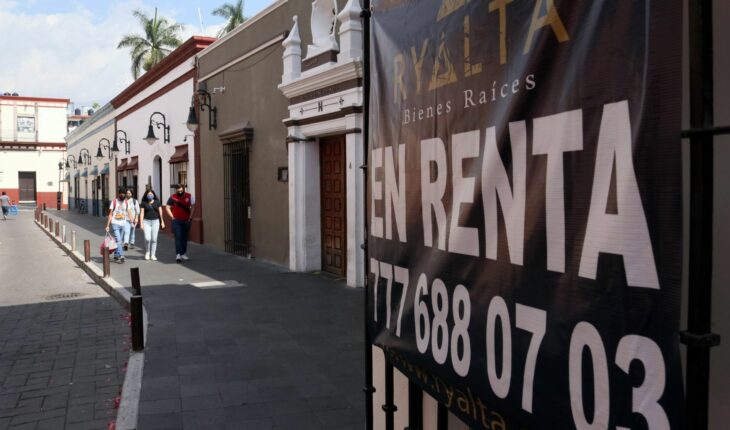Celia had turned 45 renting the same house when, as a result of the pandemic, in 2020, she lost her job and could not continue paying the rent. Celia lived in that house since she was 10 years old; there he raised his son, who is already 16; there Celia said goodbye to her own father, who has already passed away; there he takes care of his widowed mother, who is 84 years old and in poor health.
In the absence of payment, the response of her landlord, whom Celia knew all her life, was aggressive. The owner filed an appeal with the Judicial Branch of Mexico City with which he unilaterally terminated the rental contract, and gave Celia a period of three months to leave the house, which is located in the Benito Juárez mayor’s office.
Since she and her family had nowhere to go, they stayed in the house. The landlord rammed again and this time processed a real estate lease trial through which he seeks to evict her by force.
Advised by the Habitat International Coalition (HIC), Celia, who is 57 years old and a single mother, promoted an amparo lawsuit against the eviction, which has prevented, at least temporarily, that she and her family go to the street. But Celia knows she has the noose around her neck.
Read: Unprotected tenants: COVID leaves those who couldn’t afford rent homeless
“It is a terrible stress of then not being able to sleep, because the worst thing that can happen to a human being is not knowing what his immediate future is going to be; knowing that the picture does not look good, the stress situation has affected everyone here in the house,” he says in an interview. “I have nowhere to go, that’s the stress I’m in, because it’s imminent that this situation is going to end, and what makes me nervous is that I don’t know where to go. Unfortunately I don’t know what’s going to become of us, honestly.”
Celia studied business administration and has a master’s degree in corporate finance; she has worked 20 years as a financial consultant and speaks English, but, for a year and a half, she has not found a job. He borrowed from the bank, but has already gone to the credit bureau. He has resorted to the financial support of his relatives and has cooked marzipan to sell. The pension for the elderly that their mother receives has allowed them not to live, but to survive, in their own words.
Celia regrets that neither the federal nor the Mexico City governments have implemented specific measures to support people at risk of losing their homes due to the pandemic.
“It’s frustrating. How is it possible that in Mexico, which, in quotes, ‘we are better’, no help has been given, and other countries such as Spain or Canada did help to solve this? It is frustrating that supposedly this government is in favor of the poorest, but that is a lie, because right now one that is in a situation of vulnerability and poverty, it must be said, the reality is that, we do not have any help, “claims Celia.
The Office for Latin America of the HIC and the Institute of Social Research (IIS) of the UNAM prepared a study on housing conditions in Mexico City and the metropolitan area in the context of the pandemic.
The HIC and unam conducted a survey between March and May 2021 – a year after the beginning of the pandemic – to find out what difficulties households had to cover the rent payment, if they were subject to evictions or if they had to move to distant homes or with fewer qualities.
This new study, called “Survey on the situation of people residing in rented, mortgaged or borrowed homes in Mexico City before and during the pandemic”,” is an extension of a previous report that the HIC had prepared in 2020. This time, 409 online questionnaires were applied to people over the age of 18, of which 68% were women and 32% men.
The findings indicate that 55% of the people interviewed experienced difficulties in paying the rent or mortgage of their home due to job loss, reduced income, deaths of relatives and own health problems.
The study also recorded what attitude landlords had to the predicament of their tenants. In 31% of cases, the owner requested the timely and total payment of the rent; in 15% they demanded the vacancy of the house if the payment was not covered, and in 11% they threatened to go to court to evict the house. In most cases, no deadline was given to pay the rent, let alone the amount to be covered was temporarily reduced or forgiven.
Faced with difficulties in maintaining their housing, 130 people (a third of the total surveyed) had to leave the house they inhabited and change their residence; of that total, 57% moved within the same CDMX, but thethis migrated to other states, especially the State of Mexico.
People who were forced to leave their homes suffered effects on their quality of life, having had to go to live further away or to homes with less access to services such as internet, drinking water, garbage collection or public lighting, or who had fewer rooms or separate spaces, according to the results of the study.
During the pandemic, the number of people renting a property without a contract also increased (from 34% before March 2020 to 54% today), suggesting that the crisis forced tenants to accept disadvantageous housing conditions.
Tenant relationship should be regulated, experts say
The study by the Habitat International Coalition (HIC) and UNAM concludes that the pandemic created new forms of vulnerability, and reinforced pre-existing vulnerabilities in a large sector of the population that depends on renting.
Despite the centrality that the housing problem occupies in the lives of thousands of citizens, the State has not assumed an active role in regulating the relationship between landlords and tenants, nor has it implemented a plan of specific measures to help both parties – mainly those who rent – during the health emergency, says María Silvia Emanuelli, coordinator of the HIC Office for Latin America and co-author of the research.
“I believe that we have not experienced the economic recovery so desired; there are advances and setbacks, because the pandemic itself forces us to lock ourselves up again. Faced with this, the employment data I believe has not improved significantly. Recovery is slow, and there are no specific measures; there are more than 12 countries and several cities in the world that have implemented specific housing strategies, of different types, but that (in general are reduced to) establishing a moratorium on evictions; but, since there has not been this in Mexico, because people find the cheapest solutions, farther away, outside the urban center, from the spaces with the best services,” he says in an interview.
In contrast to Mexico, other countries implemented proactive measures since the beginning of the pandemic. In Spain, a credit program for tenants was approved so that they could pay rent in full to small landlords, while large landlords were forced to accept deferred payments for three months or reduce the amount of rent by 50%. In Canada, the government approved a line of “forgivable” credit for business owners who agreed to reduce rent to small business landlords by 75%. In France, the government declared a “state of health emergency” and suspended the payment of rents – as well as electricity, water and gas – banned evictions and granted landlords the possibility of deducting their tenants’ debts from taxes.
Emanuelli, who is also a lawyer and teacher in Latin American Studies, criticizes that the Mexican government’s policy to address the health emergency has been limited to the distribution of social programs, since these do not represent specific solutions to the housing crisis.
“We believe that the state should have established some more specific policies. If we look at who rents more in the CDMX, they are people who are not beneficiaries of the classic social programs of the federal government or the City; are young families, often single-parent, with a large presence of women who rent, or single people, and these people are not receiving support from the government, “says the specialist.
Antonio Azuela de la Cueva, a researcher at the Institute of Social Research (IIS) of the UNAM, co-author of the study, affirms that the fact that the government renounces to regulate the tenant relationship is a neoliberal trait, which contradicts the discourse of the current administration.
“We have to break the legacy of the neoliberal period, which this government is not yet doing; this government is still stuck in the idea that this is a private matter and that the government can do little to regulate the tenant relationship. I believe that, all these new indications that there are, what invites us is a finer, more efficient reaction, which does not have to be populist or blind. No. It has to recognize the tenant relationship in its economic dimension, recognize the tenant as the holder of a right to housing, that is the starting point, and it has to go from the substantive issues, from what are the rights of a tenant, to the procedural issues, because I believe that the judges are not taking charge of the substance of the matter, you have to look at how the jurisdictional process takes place,” says the sociologist and lawyer.
What we do at Animal Político it requires professional journalists, teamwork, dialogue with readers and something very important: independence. You can help us keep going. Be part of the team.
Subscribe to Animal Político, receive benefits and support free journalism.#YoSoyAnimal





